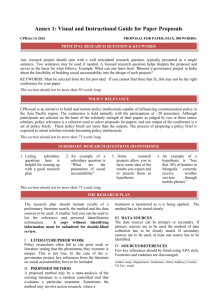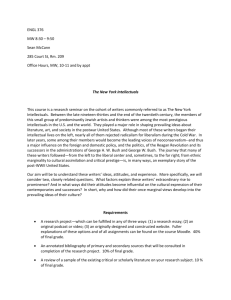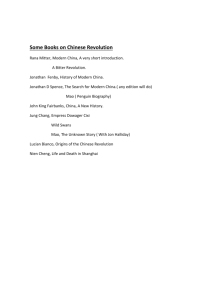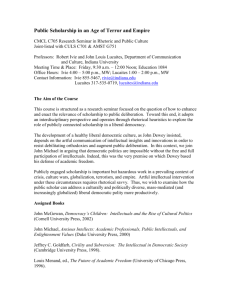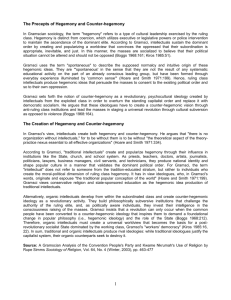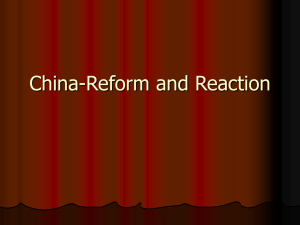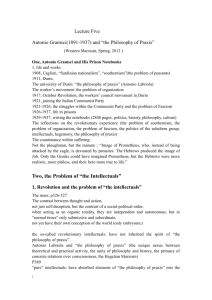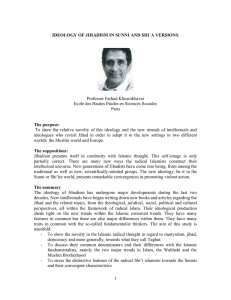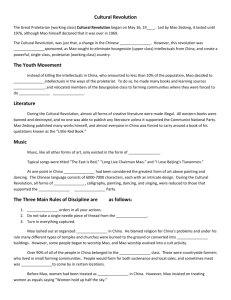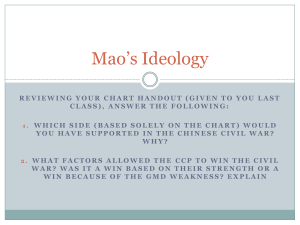paradoxch13
advertisement
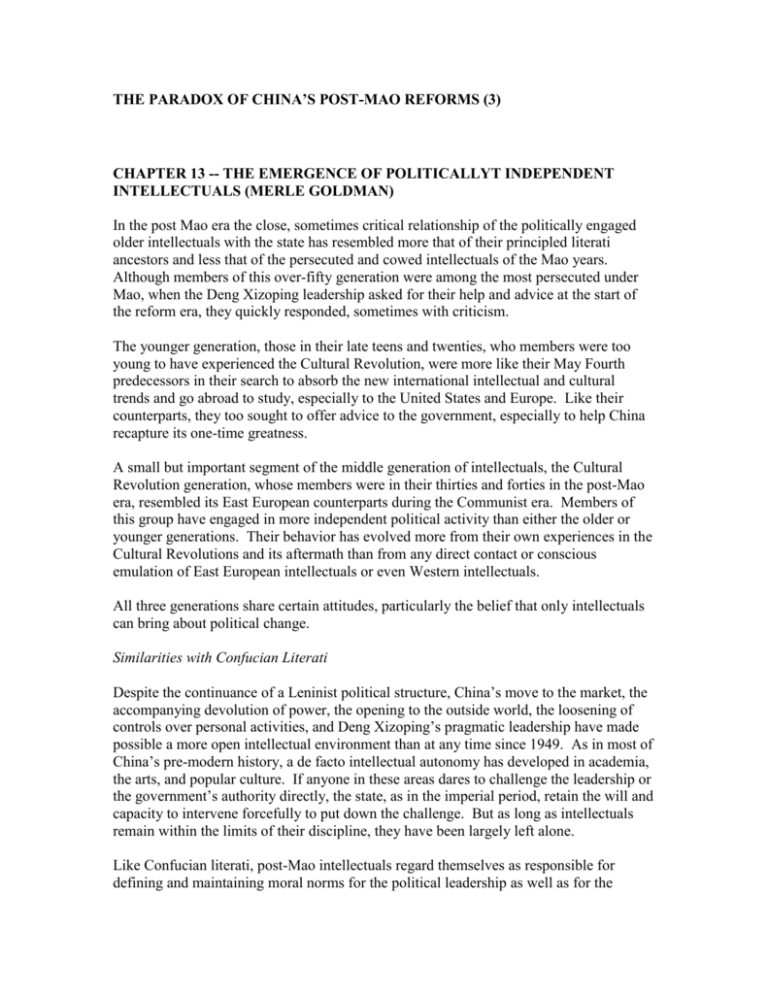
THE PARADOX OF CHINA’S POST-MAO REFORMS (3) CHAPTER 13 -- THE EMERGENCE OF POLITICALLYT INDEPENDENT INTELLECTUALS (MERLE GOLDMAN) In the post Mao era the close, sometimes critical relationship of the politically engaged older intellectuals with the state has resembled more that of their principled literati ancestors and less that of the persecuted and cowed intellectuals of the Mao years. Although members of this over-fifty generation were among the most persecuted under Mao, when the Deng Xizoping leadership asked for their help and advice at the start of the reform era, they quickly responded, sometimes with criticism. The younger generation, those in their late teens and twenties, who members were too young to have experienced the Cultural Revolution, were more like their May Fourth predecessors in their search to absorb the new international intellectual and cultural trends and go abroad to study, especially to the United States and Europe. Like their counterparts, they too sought to offer advice to the government, especially to help China recapture its one-time greatness. A small but important segment of the middle generation of intellectuals, the Cultural Revolution generation, whose members were in their thirties and forties in the post-Mao era, resembled its East European counterparts during the Communist era. Members of this group have engaged in more independent political activity than either the older or younger generations. Their behavior has evolved more from their own experiences in the Cultural Revolutions and its aftermath than from any direct contact or conscious emulation of East European intellectuals or even Western intellectuals. All three generations share certain attitudes, particularly the belief that only intellectuals can bring about political change. Similarities with Confucian Literati Despite the continuance of a Leninist political structure, China’s move to the market, the accompanying devolution of power, the opening to the outside world, the loosening of controls over personal activities, and Deng Xizoping’s pragmatic leadership have made possible a more open intellectual environment than at any time since 1949. As in most of China’s pre-modern history, a de facto intellectual autonomy has developed in academia, the arts, and popular culture. If anyone in these areas dares to challenge the leadership or the government’s authority directly, the state, as in the imperial period, retain the will and capacity to intervene forcefully to put down the challenge. But as long as intellectuals remain within the limits of their discipline, they have been largely left alone. Like Confucian literati, post-Mao intellectuals regard themselves as responsible for defining and maintaining moral norms for the political leadership as well as for the population at large. Through personal political contacts and articles in the official and semi-official newspapers and journals that emerged in the Deng era, they sought to act as the conscience of society, as they were unable to do under Mao. The traditional pre-modern style of cooperation between the intellectuals and the government, severed in the Mao era, resumed with Deng Xiaoping and his successor, Jiang Zemin. Like their literati predecessors, as intellectuals have served and advised the political leadership, they have been drawn into the policymaking process by their political patrons, each group seeking to use the other for its own political purposes. Such political-intellectual alliances have been held together in some cases by formal linkages but, for the most part, by shared political views and values that have woven a variety of informal intellectual and political networks rather than by purely organizational ties. In the 1980s intellectuals discussed [policy matters relatively freely among themselves and at conferences. They published their views and conducted debates publicly in newspapers, journals, and books. But their ability to do this, as in traditional times, was determined by political patronage. Like their literati forebears, there were no laws to protect them. If their patrons were purged, their advice would be rejected. In the 1990s, therefore, although discussions among colleagues with a variety of views were still relatively free, the ability of reformist intellectuals to express themselves publicly was quite limited. Similarities with the May Fourth Generation The pluralistic intellectual atmosphere of the post-Mao era, made possible by China’s opening to the outside world and move to the market, has been comparable to the pluralism of the early decades of the twentieth century. Intellectuals, like their May Fourth predecessors, began to explore all kinds of new ideas and to question the orthodox ideology. In the 1980s they sought intellectual inspiration from the West and from their ethnic brethren and cultural cousins in East Asia. The interqacted with Western intellectuals and overseas Chinese intellectuals, especially from Hong Kong and Taiwan, the majority of whom were Western-trained. Like the late Qing literati and the May Fourth generation, most post-Mao intellectuals have been rationalists in the tradition of the Enlightenment. However, a substantial minority, particularly those in the arts, have questioned this approach. Nonconformist artists, writers, and poets have been prominent on the cultural scene and were especially so in the early Deng years. The Cultural Revolution experience led them to question whether there could be any rational or political solutions to China’s complex problems. They concluded that the arts should not be used for political goals. Despite the parlty’s periodic efforts to regain control over intellectual and cultural discourse, the intellectuals and artists of the post-Mao era have developed a degree of autonomy from party manipulation. The move to the market and international contacts have made them less dependent on the state, economically as well as intellectually, through modern means of communications such as telephone, television, computers, faxes, film and e-mail. Intellectuals have taken advantrage of the party’s loosening-grip to fill the public space vacated by jthe state with informal salons, study groups, journals, and think tanks. Politically Engaged Intellectuals of the Cultural Revolution Generation The experience of the Cultural Revolution generation has diverged from that of the traditional literati and the elite intellectuals of the Mao and Deng eras as well as from the generation that came of age in the post-Mao period. Unlike the others, the education of this generation, born after 1949, was interrupted by Mao’s 1966 summons to rebel against authority. Most initially became Red Guards, following Mao’s orders to question and overthrow bureaucratic and intellectual authorities, sometimes violently. When Mao in the late 1960s condemned these activities, carried out in his name, and sent the Red Guards to farms and factories to reform themselves through labor, he provoked profound disillusionment not only with his leadership but also with the ideology and the political system that had given the Chairman the power to manipulate their lives. This experience of their formative years left them bereft of belief, a loss somewhat akin to their late Qing literati predecessors’ loss of faith in Confucianism. While the intellectual elite of the older generation and other Cultural Revolution intellectuals continued to used ideological revisions, political discourse, and high-level patronage to press for change from the top down, much in the tradition of their literati predecessors, the new generation and the ex-Red Guard associates sought to bring about political change from the bottom up with methods that they had been exposed to in the Cultural Revolution. Contacts with Workers and Other Classes By 1987 it had been concluded that intellectuals could achieve political reforms only in coalition with other social groups, specifically allying with industrialists, rural entrepreneurs, and reform officials, but not with farmers or workers. The student protestors in the Tiananmen Square 1989 demonstration revealed a similar elitism when they literally locked arms to keep the workers from participating in their protest. Although the students talked about sending delegations to the factories to link up with workers as their May Fourth predecessors had done, few did so. In addition to their elitism and their awareness of the fact that since 1980 the leadership’s greatest fear was the formation of a Solidarity-like coalition between intellectuals and workers. Conclusion For independent political actors to re-emerge and survive, they will need much more support from Chinese society than they had in the 1980s, and they will need laws to protect their independence if they are to have an impact on policymaking.
